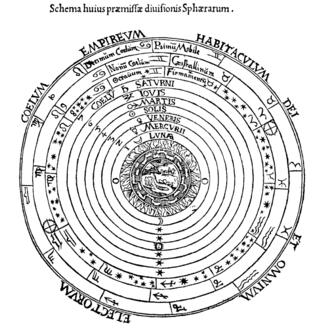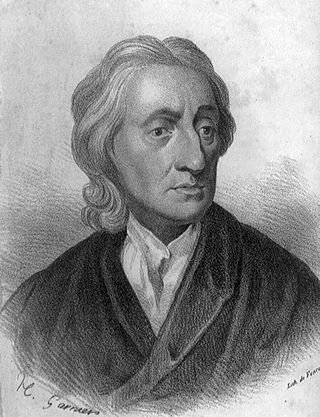Related Research Articles

In philosophy, empiricism is an epistemological view which holds that true knowledge or justification comes only or primarily from sensory experience and empirical evidence. It is one of several competing views within epistemology, along with rationalism and skepticism. Empiricists argue that empiricism is a more reliable method of finding the truth than purely using logical reasoning, because humans have cognitive biases and limitations which lead to errors of judgement. Empiricism emphasizes the central role of empirical evidence in the formation of ideas, rather than innate ideas or traditions. Empiricists may argue that traditions arise due to relations of previous sensory experiences.

Gottfried Wilhelm Leibniz or Leibnitz was a German polymath active as a mathematician, philosopher, scientist and diplomat who is credited, alongside Sir Isaac Newton, with the invention of calculus in addition to many other branches of mathematics, such as binary arithmetic, and statistics. Leibniz has been called the "last universal genius" due to his knowledge and skills in different fields and because such people became much less common after his lifetime with the coming of the Industrial Revolution and the spread of specialized labor. He is a prominent figure in both the history of philosophy and the history of mathematics. He wrote works on philosophy, theology, ethics, politics, law, history, philology, games, music, and other studies. Leibniz also made major contributions to physics and technology, and anticipated notions that surfaced much later in probability theory, biology, medicine, geology, psychology, linguistics and computer science.
Substance theory, or substance–attribute theory, is an ontological theory positing that objects are constituted each by a substance and properties borne by the substance but distinct from it. In this role, a substance can be referred to as a substratum or a thing-in-itself. Substances are particulars that are ontologically independent: they are able to exist all by themselves. Another defining feature often attributed to substances is their ability to undergo changes. Changes involve something existing before, during and after the change. They can be described in terms of a persisting substance gaining or losing properties. Attributes or properties, on the other hand, are entities that can be exemplified by substances. Properties characterize their bearers; they express what their bearer is like.

Tabula rasa is the idea of individuals being born empty of any built-in mental content, so that all knowledge comes from later perceptions or sensory experiences. Proponents typically form the extreme "nurture" side of the nature versus nurture debate, arguing that humans are born without any "natural" psychological traits and that all aspects of one's personality, social and emotional behaviour, knowledge, or sapience are later imprinted by one's environment onto the mind as one would onto a wax tablet. This idea is the central view posited in the theory of knowledge known as empiricism. Empiricists disagree with the doctrines of innatism or rationalism, which hold that the mind is born already in possession of specific knowledge or rational capacity.
In metaphysics, extension signifies both 'stretching out' as well as later 'taking up space', and most recently, spreading one's internal mental cognition into the external world.
In philosophy, rationalism is the epistemological view that "regards reason as the chief source and test of knowledge" or "any view appealing to reason as a source of knowledge or justification", often in contrast to other possible sources of knowledge such as faith, tradition, or sensory experience. More formally, rationalism is defined as a methodology or a theory "in which the criterion of truth is not sensory but intellectual and deductive".

In common usage and in philosophy, ideas are the results of thought. Also in philosophy, ideas can also be mental representational images of some object. Many philosophers have considered ideas to be a fundamental ontological category of being. The capacity to create and understand the meaning of ideas is considered to be an essential and defining feature of human beings.

Étienne Bonnot de Condillac was a French philosopher, epistemologist, and Catholic priest, who studied in such areas as psychology and the philosophy of the mind.

Nicolas Malebranche was a French Oratorian Catholic priest and rationalist philosopher. In his works, he sought to synthesise the thought of St. Augustine and Descartes, in order to demonstrate the active role of God in every aspect of the world. Malebranche is best known for his doctrines of vision in God, occasionalism and ontologism.
In the philosophy of mind, innatism is the view that the mind is born with already-formed ideas, knowledge, and beliefs. The opposing doctrine, that the mind is a tabula rasa at birth and all knowledge is gained from experience and the senses, is called empiricism.

An Essay Concerning Human Understanding is a work by John Locke concerning the foundation of human knowledge and understanding. It first appeared in 1689 with the printed title An Essay Concerning Humane Understanding. He describes the mind at birth as a blank slate filled later through experience. The essay was one of the principal sources of empiricism in modern philosophy, and influenced many enlightenment philosophers, such as David Hume and George Berkeley.

Essais de Théodicée sur la bonté de Dieu, la liberté de l'homme et l'origine du mal, more simply known as Théodicée, is a book of philosophy by the German polymath Gottfried Leibniz. The book, published in 1710, introduced the term theodicy, and its optimistic approach to the problem of evil is thought to have inspired Voltaire's Candide. Much of the work consists of a response to the ideas of the French philosopher Pierre Bayle and based on the author's conversation with Sophia Charlotte of Hanover, with whom Leibniz carried on a debate for many years.

Johannes Goropius Becanus, born Jan Gerartsen, was a Dutch physician, linguist, and humanist.

Some Thoughts Concerning Education is a 1693 treatise on the education of gentlemen written by the English philosopher John Locke. For over a century, it was the most important philosophical work on education in England. It was translated into almost all of the major written European languages during the eighteenth century, and nearly every European writer on education after Locke, including Jean-Jacques Rousseau, acknowledged its influence.

Nous, from Greek: νοῦς, is a concept from classical philosophy, sometimes equated to intellect or intelligence, for the faculty of the human mind necessary for understanding what is true or real.
Natura non facit saltus has been an important principle of natural philosophy. It appears as an axiom in the works of Gottfried Leibniz, one of the inventors of the infinitesimal calculus. It is also an essential element of Charles Darwin's treatment of natural selection in his Origin of Species. The Latin translation comes from Linnaeus' Philosophia Botanica.

The primary–secondary quality distinction is a conceptual distinction in epistemology and metaphysics, concerning the nature of reality. It is most explicitly articulated by John Locke in his Essay concerning Human Understanding, but earlier thinkers such as Galileo and Descartes made similar distinctions.
Noogony is a general term for any theory of knowledge that attempts to explain the origin of concepts in the human mind by considering sense or a posteriori data as solely relevant.
The principle of individuation is a criterion that individuates or numerically distinguishes the members of the kind for which it is given, that is by which we can supposedly determine, regarding any kind of thing, when we have more than one of them or not. It is also known as a 'criterion of identity' or 'indiscernibility principle'. The history of the consideration of such a principle begins with Aristotle. It was much discussed by the medieval philosopher Duns Scotus with his "haecceity" and later, during Renaissance, by Francisco Suárez (1548–1617), Bonaventure Baron (1610–1696) and Leibniz (1646–1716).
Personal identity is the unique numerical identity of a person over time. Discussions regarding personal identity typically aim to determine the necessary and sufficient conditions under which a person at one time and a person at another time can be said to be the same person, persisting through time.
References
- ↑ Oeuvres philosophiques, latines et françoises, de feu Mr. de Leibnitz, tirées de ses manuscrits, qui se conservent dans la bibliothèque royale à Hanovre, et publiées par Rud. Eric Raspe, Amsterdam et Leipzig, 1765.
- ↑ "θεόφιλος". LSJ .
- ↑ "φιλαλήθης". LSJ .
- ↑ Book II, Ch. 1, §2: "Nihil est in intellectu quod non fuerit in sensu excipe: nisi ipse intellectus".
- ↑ G. W. Leibniz, New Essays on Human Understanding. Translated and edited by Peter Remnant and Jonathan Bennett. New York: Cambridge University Press, 1981, p. 74.